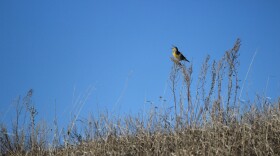One of Prairie Public’s more popular television shows is Nature. Some of you may have seen the episode a few weeks ago on shorebird migrations. The show addressed how shorebirds navigate the trip, the risks of migration, and how human activity is creating problems for the birds. One of the shorebirds featured was the marbled godwit on its migration from Panama to the Dakotas.
Marbled godwits are large shorebirds, approaching 20 inches long and a wingspan of around 30 inches, with long legs and a bill that is around 3-5 inches long. Their body is heavily barred with browns, cinnamon, and white. The bill is dark colored with an orangish base. It is distinctive in that it curves slightly upward.
The breeding range for marbled godwits is roughly the Dakotas and southern prairie region of Manitoba, Saskatchewan, and Alberta where they prefer to nest in native prairie, sometimes at a considerable distance from a marsh where they feed in the shallow water by probing the mud for aquatic insects, mollusks, small crustaceans, and the like. They are known to nest over much of North Dakota, but mostly north and east of the Missouri River.
Their breeding season in North Dakota begins around mid-April. The nest will consist of a shallow depression lined with grass, preferably amongst the short grasses of an upland site with shallow wetlands nearby. They will produce one brood, with about four eggs in a clutch.
If you are ever out walking across the prairie and get a little too close to a godwit nest, the birds will promptly inform you that you are trespassing on their territory by boisterously and raucously calling with a loud “kerreck, kerrreck, kereck.”
Marbled godwit populations appear to be holding steady. However, loss of prairie to other land uses, wetland drainage, and development and other changes to their winter habitat in Latin America do not bode well for them in the future.





